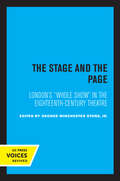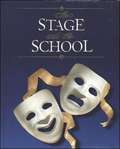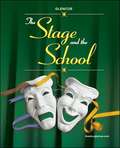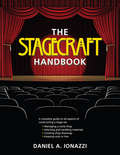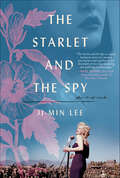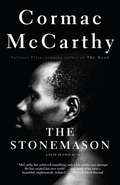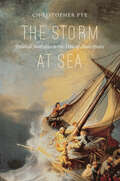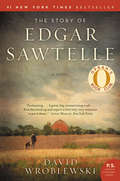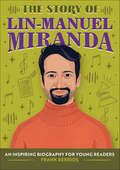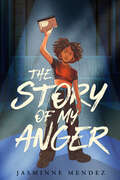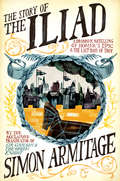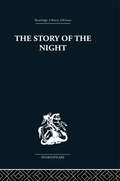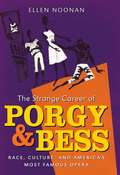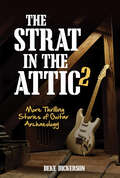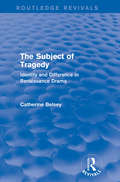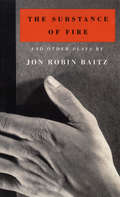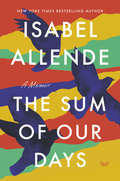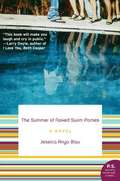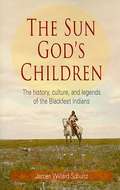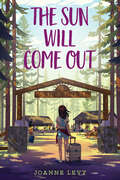- Table View
- List View
The Stage and the Page: London's Whole Show in the Eighteenth-Century Theatre (Clark Library Professorship, UCLA #6)
by Geo. Winchester StoneThis title is part of UC Press's Voices Revived program, which commemorates University of California Press’s mission to seek out and cultivate the brightest minds and give them voice, reach, and impact. Drawing on a backlist dating to 1893, Voices Revived makes high-quality, peer-reviewed scholarship accessible once again using print-on-demand technology. This title was originally published in 1981.
The Stage and the School
by Harry H. Schanker Katharine Anne OmmanneyThe Stage and the School offers more of what you've always loved about the nation's most comprehensive high school drama program. More hands-on exercises. More teacher support. More discussion of the conventions of the theatre. More opportunities to creative expression through performance. More connections to the other arts. With all the hands-on exercises and application activities, scenes and monologues, chapter openers and reviews, students are provided with every opportunity for success.
The Stage and the School, Ninth Edition
by Harry H. Schanker Katharine Anne OmmanneyThe Stage and the School provides students and teachers with the tools needed to build key theater arts skills. Students receive instruction in classic training exercises, production techniques, and theater conventions. Skills are developed through lessons that help students draw on their personal experiences and build historical and cultural background knowledge.
The Stagecraft Handbook
by Daniel IonazziGet the complete, illustrated guide to scenery construction Using nails and wood, fabric and paint, hardware and rigging, you create an illusion. You build the make-believe world of the play. Now you have a scene-shop manual to help you. In The Stagecraft Handbook, Daniel A. Ionazzi, director of production for the UCLA Department of Theater, offers trap-room-to-grid guidance. Clearly written, heavily illustrated, this book covers every aspect of scenery construction. Turn here and learn about: the four primary stage configurations–proscenium, thrust, arena and environmental flying scenery and moving floors organizing the scene shop to make good scenery quickly and inexpensively shop tools and safety scaled drawings, models and other communications tools you'll use to translate the designer's vision into a set materials commonly used in building scenery construction techniques for flats, platforms and other standard scenic units installing and rigging scenery maintaining an inventory of stock scenery Let The Stagecraft Handbook help you turn ordinary materials into extraordinary illusions.
The Starlet and the Spy: A Novel
by Ji-min Lee“This story of the unlikely meeting of two vulnerable women is a beautifully woven page turner. The battle-weary woman and the pin-up girl who meet, connect, separate: each changed by the brief union.” --Heather Morris, author of the #1 New York Times bestseller The Tattooist of AuschwitzA dazzling work of historical fiction, based on true events, about two women who seem the most unlikely to ever meet: Alice, a Korean war survivor and translator for the American forces in Seoul and Marilyn Monroe, who is visiting Korea on a four-day USO tour.February 1954. Although the Korean War armistice was signed a year ago, most citizens of Seoul still battle to return to some semblance of normalcy. Conditions are dismal. Children beg for food, and orphanages are teeming. Alice J. Kim, a Korean translator and typist for the American forces still sanctioned in the city, yearns for the life she used to live before her country was torn apart.Then Alice’s boss makes an announcement—the American movie star Marilyn Monroe will be visiting Korea on a four-day USO tour, and Alice has been chosen as her translator. Though intrigued, Alice has few expectations of the job—what could she and a beautiful actress at the peak of her fame possibly have to talk about? Yet the Marilyn she meets, while just as dazzling and sensual as Alice expected, is also surprisingly approachable.As Marilyn’s visit unfolds, Alice is forced into a reckoning with her own painful past. Moving and mesmerizing, The Starlet and the Spy is a beautiful portrayal of unexpected kinship between two very different women, and of the surprising connections that can change, or even save, a life.
The Stonemason: A Play in Five Acts
by Cormac MccarthyBen Telfair has given up his education to apprentice himself to his grandfather, a man who knows that true masonry is not held together by cement but by the warp of the world.
The Storm at Sea: Political Aesthetics in the Time of Shakespeare
by Christopher PyeThe Storm at Sea: Political Aesthetics in the Time of Shakespeare counters a tradition of cultural analysis that judges considerations of aesthetic autonomy in the early modern context to be either anachronistic or an index of political disengagement. Pye argues that for a post-theocratic era in which the mise-en-forme of the social domain itself was for the first time at stake, the problem of the aesthetic lay at the very core of the political; it is precisely through its engagement with the question of aesthetic autonomy that early modern works most profoundly explore their relation to matters of law, state, sovereignty, and political subjectivity.Pye establishes the significance of a “creationist” political aesthetic—at once a discrete historical category and a phenomenon that troubles our familiar forms of historical accounting—and suggests that the fate of such an aesthetic is intimately bound up with the emergence of modern conceptions of the political sphere.The Storm at Sea moves historically from Leonardo da Vinci to Thomas Hobbes; it focuses on Shakespeare and English drama, with chapters on Hamlet, Othello, A Winter’s Tale, and The Tempest, as well as sustained readings of As You Like It, King Lear, Thomas Kyd’s Spanish Tragedy, and Christopher Marlowe’s Doctor Faustus. Engaging political thinkers such as Carl Schmitt, Giorgio Agamben, Claude Lefort, and Roberto Esposito, The Storm at Sea will be of interest to political theorists as well as to students of literary and visual theory.
The Story of Edgar Sawtelle: A Novel
by David WroblewskiAn Oprah's Book Club Pick#1 New York Times Bestseller“A mystery, a thriller, a ghost story, and a literary tour de force . . . an authentic epic, long and lush, full of back story and observed detail . . . the author exercises a certain magic that catches and holds our attention, a magic that is undeniably his own.”—Los Angeles Times Book ReviewBorn mute, speaking only in sign, Edgar Sawtelle leads an idyllic life on his family’s farm in remote northern Wisconsin, where they raise and train an extraordinary breed of dog. But when tragedy mysteriously strikes, Edgar is forced to flee into the vast neighboring wilderness, accompanied by three yearling dogs. He comes of age in the wild, struggling for survival, until the day Edgar is forced to choose between leaving forever and returning home to learn the truth behind what has happened.Filled with breathtaking scenes—the elemental north woods, the sweep of seasons, an iconic American barn, a fateful vision rendered in the falling rain—The Story of Edgar Sawtelle is a meditation on the limits of language and what lies beyond, a brilliantly inventive retelling of an ancient story, and an epic tale of devotion, betrayal, and courage in the American heartland.
The Story of Lin-Manuel Miranda: An Inspiring Biography for Young Readers (The Story of Biographies)
by Frank BerriosDiscover the life of Lin-Manuel Miranda—a story about creating change through art, for kids ages 6 to 9 Lin-Manuel Miranda is an award-winning composer, actor, and playwright—best known for the hit musical Hamilton, which he created! Before he changed the world of entertainment, Lin-Manuel was an intelligent young boy who loved music and musicals. He was inspired to write his own songs and plays, and his life changed when the plays he wrote became huge successes on Broadway. This book explores how Lin-Manuel went from being an artistic boy growing up in New York City to a rising star and Pulitzer Prize winner.Independent reading—This Lin-Manuel Miranda biography is broken down into short chapters and simple language so kids 6 to 9 can read and learn on their own.Critical thinking—Kids will learn the Who, What, Where, When, Why, and How of Lin-Manuel's life, find definitions of new words, discussion questions, and more.A lasting legacy—Discover how Lin-Manuel has transformed the performing arts and brought Broadway plays to a wider audience.How will Lin-Manuel's dedication to his art and activism inspire you?Discover activists, artists, athletes, and more from across history with the rest of the Story Of series, including famous figures like: Selena Quintanilla, Frida Kahlo, Stan Lee, Maya Angelou, and Audrey Hepburn.
The Story of My Anger
by Jasminne MendezThe Pura Belpré Honor Award winning author of Aniana del Mar Jumps In makes her YA debut with a powerful novel-in-verse about a Texas teen who is battling racism in her theatre program and book banning efforts by her town&’s school board.Yulieta Lopez is angry. Angry at her racist drama teacher who refuses to cast Black students in lead roles. Angry at the school board threatening her favorite teacher for teaching works of literature that they deem &“controversial.&” Angry that she has to keep quiet until she can head to college and leave Texas forever.Yuli is accustomed to playing various roles: the diligent daughter, the honorable hija, the good girl who serves everyone else before serving herself. But as the fire of Yuli's rage spreads and lights her up, she can no longer be silent. Determined to find a way to fight back, Yuli and her friends start a guerilla theatre club which stirs things up and gets people talking, and finally, Yuli steps into the role she was always meant to play.
The Story of the Iliad: A Dramatic Retelling of Homer’s Epic and the Last Days of Troy
by Simon ArmitageAward-winning poet Simon Armitage dramatizes the story of Troy, animating this classic epic for a new generation of readers. Following his highly acclaimed dramatization of the Odyssey, Simon Armitage here takes on the fate of Troy, bringing Homer's Iliad to life with refreshing imaginative vision. In the final days of the Trojan War, the Trojans and the Greeks are caught in a bitter stalemate. Exhausted and desperate after ten years of warfare, gods and men battle among themselves for the glory of recognition and a hand in victory. Cleverly intertwining the Iliad and the Aeneid, Armitage poetically narrates the tale of Troy to its dire end, evoking a world plagued by deceit, conflict, and a deadly predilection for pride and envy. As with the Odyssey, Armitage reveals the echoes of ancient myth in our contemporary war-torn landscape, and reinvigorates the classic epics with adventure, passion, and, surprisingly, Shakespearean wit.
The Story of the Night: Studies in Shakespeare's Major Tragedies
by John HollowayFirst published in 1961. Critiquing the critics, and examining the vocabulary of twentieth century criticism of the Shakespearean tragedies, John Holloway's book covers Hamlet, Othello, Macbeth, King Lear, Antony and Cleopatra, Coriolanus, Timon of Athens and the themes of Shakespearean Tragedy and the idea of human sacrifice and the concepts of myth and ritual in literature.
The Strange Career of Porgy and Bess
by Ellen NoonanCreated by George Gershwin and DuBose Heyward and sung by generations of black performers, Porgy and Bess has been both embraced and reviled since its debut in 1935. In this comprehensive account, Ellen Noonan examines the opera's long history of invention and reinvention as a barometer of twentieth-century American expectations about race, culture, and the struggle for equality. In its surprising endurance lies a myriad of local, national, and international stories.For black performers and commentators, Porgy and Bess was a nexus for debates about cultural representation and racial uplift. White producers, critics, and even audiences spun revealing racial narratives around the show, initially in an attempt to demonstrate its authenticity and later to keep it from becoming discredited or irrelevant. Expertly weaving together the wide-ranging debates over the original novel, Porgy, and its adaptations on stage and film with a history of its intimate ties to Charleston, The Strange Career of "Porgy and Bess" uncovers the complexities behind one of our nation's most long-lived cultural touchstones.
The Stranger: A gripping thriller from the #1 bestselling creator of hit Netflix show Fool Me Once (Myron Bolitar Ser. #11)
by Harlan CobenNOW A MAJOR NETFLIX SERIES. WE ALL HAVE SECRETS...'I wanted to finish it so fast so I could learn the truth about what really happened' ⭐⭐⭐⭐⭐'Right from page one this is a real pageturner' ⭐⭐⭐⭐⭐Adam Price has a lot to lose: a beautiful family, a big house, a good job - a perfect life.But then he meets a stranger in a bar and learns a shocking secret about his wife.With the mirage of perfection shattered, Adam finds himself caught up in something far darker than his wife's deception.And if he doesn't make the right moves, the conspiracy he's stumbled into will not only ruin lives - it will end them.
The Stranger: Now a major Netflix show
by Harlan CobenThe Stranger appears out of nowhere, perhaps in a bar, or a parking lot, or at the grocery store. His identity is unknown. His motives are unclear. His information is undeniable. Then he whispers a few words in your ear and disappears, leaving you picking up the pieces of your shattered world.Adam Price has a lot to lose: a comfortable marriage to a beautiful woman, two wonderful sons, and all the trappings of the American Dream - a big house, a good job, a seemingly perfect life.Then he runs into the Stranger. When he learns a devastating secret about his wife, Corrine, he confronts her, and the mirage of perfection disappears as if it never existed at all. Soon Adam finds himself tangled in something far darker than even Corrine's deception, and realises that if he doesn't make exactly the right moves, the conspiracy he's stumbled into will not only ruin lives - it will end them.Read by Eric Meyers(p) 2015 Orion Publishing Group
The Strat in the Attic 2: More Thrilling Stories of Guitar Archaeology
by Deke DickersonDon’t fret! The music historian and guitar sleuth brings you more astounding stories of rare guitar finds and the legends who owned them.Do you dream of finding a 1954 Stratocaster or 1952 Gibson Les Paul online, at a garage sale, or in the local penny saver? How about virtually rubbing elbows with one of your favorite rock legends? Following up his first-of-its-kind The Strat in the Attic, musician, journalist, and “guitarchaeologist” Deke Dickerson shares the stories behind dozens of more astounding finds including:A rarer-than-hens-teeth 1966 Hallmark Swept-Wing that originally belonged to Robbie Krieger of the Doors, stashed away in an attic in Alaska for forty years!A crazy-valuable 1958 Gibson Flying V belonging to a Chicago bluesman—who, it turns out, also happens to have an equally rare 1958 Gibson Explorer!An out-of-the-blue, a “to whom it may concern” email leads the author to a trailer park in Salem, Oregon, where one of Bob Wills and the Texas Playboys’ original 1940s Epiphone Emperor archtops is waiting to be purchased for a song!Luthier R.C. Allen relates the tales of buying Nat “King” Cole Trio guitarist Oscar Moore’s Stromberg Master 400 archtop and of being gifted a 1953 Standel amp from Merle Travis!Buddy Merrill, the amazingly talented guitarist from the Lawrence Welk show, gives his 1970 Micro-Frets Huntington to the author, but only if he “promises to PRACTICE.”Photos of the guitars and other exciting memorabilia round out a package that no vintage-guitar aficionado will want to be without!“The man knows how to tell a great story.” —Jonathan Kellerman, #1 New York Times–bestselling author
The Street Where I Live: A Memoir (Pop Concert Full Orchestra Ser.)
by Alan J. Lerner“Lerner will always be remembered as a Broadway light, and one of the brightest.” —Tom Shales, The Washington Post The Street Where I Live is at once an intimate biography of three great shows—My Fair Lady, Gigi, and Camelot—and a candid account of the life and times of Alan J. Lerner, one of America’s most acclaimed and popular lyricists. Large-hearted, humorous, and often poignant in its reverence for a celebrated era in the American theater, this is the story of what Lerner calls "the sundown of wit, eccentricity, and glamour." Try as he might to keep himself out of these pages, Lerner reveals himself to be a man of great talent, laughter, and love. Along the way, we meet a sensational supporting cast: Moss Hart, Fritz Loewe, Julie Andrews, Richard Burton, Rex Harrison, Cecil Beaton, Louis Jourdan, and Maurice Chevalier, to name a few. They are seen in moments of triumph and disaster, but all are professionals at the creation of theater. And the creation of theater is the matrix of this wonderful book. Included are the complete lyrics to My Fair Lady, Gigi, and Camelot.
The Structure and Performance of Euripides' Helen
by C. W. MarshallUsing Euripides' play, Helen, as the main point of reference, C. W. Marshall's detailed study expands our understanding of Athenian tragedy and provides new interpretations of how Euripides created meaning in performance. Marshall focuses on dramatic structure to show how assumptions held by the ancient audience shaped meaning in Helen and to demonstrate how Euripides' play draws extensively on the satyr play Proteus, which was part of Aeschylus' Oresteia. Structure is presented not as a theoretical abstraction, but as a crucial component of the experience of performance, working with music, the chorus and the other plays in the tetralogy. Euripides' Andromeda in particular is shown to have resonances with Helen not previously described. Arguing that the role of the director is key, Marshall shows that the choices that a director can make about role doubling, gestures, blocking, humour, and masks play a crucial part in forming the meaning of Helen.
The Struggle for Shakespeare's Text
by Gabriel EganWe know Shakespeare's writings only from imperfectly-made early editions, from which editors struggle to remove errors. The New Bibliography of the early twentieth century, refined with technological enhancements in the 1950s and 1960s, taught generations of editors how to make sense of the early editions of Shakespeare and use them to make modern editions. This book is the first complete history of the ideas that gave this movement its intellectual authority, and of the challenges to that authority that emerged in the 1980s and 1990s. Working chronologically, Egan traces the struggle to wring from the early editions evidence of precisely what Shakespeare wrote. The story of another struggle, between competing interpretations of the evidence from early editions, is told in detail and the consequences for editorial practice are comprehensively surveyed, allowing readers to discover just what is at stake when scholars argue about how to edit Shakespeare.
The Subject of Tragedy: Identity and Difference in Renaissance Drama (Routledge Revivals)
by Catherine BelseyFirst published in 1985, The Subject of Tragedy takes the drama of the sixteenth and seventeenth centuries as the starting point for an analysis of the differential identities of man and woman. Catherine Belsey charts, in a range of fictional and non-fictional texts, the production in the Renaissance of a meaning for subjectivity that is identifiably modern. The subject of liberal humanism – self-determining, free origin of language, choice and action – is highlighted as the product of a specific period in which man was the subject to which woman was related.
The Substance of Fire and Other Plays
by Jon Robin BaitzA frank examination of the controlling forces behind a nearly bankrupt private school for boys in South Africa, The Film Society introduced a young playwright with an extraordinarily mature grasp of people, language and society.Baitz's recent works have fulfilled his early promise and enhanced his reputation. <P><P>In The Substance of Fire (1991), a fiercely intellectual New York publisher struggles with his children for control of his business, and with the relentless pride which has made him previous to love. In The End of the Day (1992), an expatriate British doctor adapts to America by abandoning his ideals and succumbing to the twin lures of status and crime.About the Author: Jon Robin Baitz is the author of Three Hotels, The Film Society, Other Desert Cities, The End of the Day, and The Substance of Fire, which he adapted into a major motion picture. He was the showrunner on ABC's Brothers & Sisters. He also wrote the screenplay for the upcoming film Stonewall directed by Roland Emmerich. He lives in New York.
The Sum of Our Days: A Memoir (P. S. Ser.)
by Isabel AllendeNarrated with warmth, humor, exceptional candor and wisdom, The Sum of Our Days is a portrait of a contemporary family, tied together by the love, strong will, and stubborn determination of a beloved matriarch, the indomitable New York Times bestselling author of The House of the Spirits, Isabel Allende. "An inspiring and thought-provoking work." –Denver Post Isabel Allende reconstructs the painful reality of her own life in the wake of the tragic death of her daughter, Paula. Narrated with warmth, humor, exceptional candor, and wisdom, this remarkable memoir is as exuberant and as full of life as its creator. Allende bares her soul while sharing her thoughts on love, marriage, motherhood, spirituality and religion, infidelity, addiction, and memory—and recounts stories of the wildly eccentric, strong-minded, and eclectic tribe she gathers around her and lovingly embraces as a new kind of family.
The Summer of Naked Swim Parties: A Novel
by Jessica Anya Blau“This book will make you laugh and cry in public.” —Larry Doyle, author of I Love You, Beth CooperJessica Anya Blau's passionate and poignant debut novel of one girl’s coming of age in 1970s southern California, replete with stoners, hippies, surfers, bitchy girlfriends, first love, first heartbreak, and OPI shorts Jamie Green will remember “the summer of naked swim parties” for the rest of her life. It’s the summer in which she has her first serious boyfriend, Flip, who is three years older and comes with friends for Jamie’s friends; it’s the summer in which Jamie’s older sister is away at Outward Bound, leaving Jamie with her parents (and very often the house) to herself; it’s the summer in which Jamie’s parents throw naked swim parties, leaving Jamie cringing with embarrassment. And it’s the summer in which Jamie will be forced to confront love, loss, family, and heartbreak for the very first time.
The Sun God's Children: The History, Culture, and Legends of the Blackfeet Indians
by James Willard SchultzThe Blackfeet were people of the buffalo. They originated on the plains of today's southern Alberta, western Saskatchewan, and central Montana. In the 1830s famed artist and explorer George Catlin called the Blackfeet the most powerful tribe of Indians on the continent.
The Sun Will Come Out
by Joanne LevyThe Sun Will Come Out is a funny and heartwarming account of a shy girl’s first summer away from home, where she learns she really can do anything and that silver linings can be found just about anywhere. Twelve-year-old Bea Gelman and her best friend Frankie are planning the BEST SUMMER EVER at Camp Shalom—a sleep-away camp. But at the last minute, Frankie bows out, leaving painfully shy Bea on her own. Just talking to strangers causes Bea to break out into ugly, blotchy hives. As if the hives weren't bad enough, Bea gets pranked by a couple of girls in her cabin and is betrayed by someone she thought was a new friend. Bea has had enough! She decides to spend her summer in the infirmary far away from everything that’s stressing her out. No more boys (including her crush, Jeremy), no more horrible mean girls, and no more fake friends! At the infirmary, Bea meets Harry, a boy facing challenges way more intense than stress breakouts. Inspired by Harry’s strength and positive outlook, Bea decides to face her fears—in a big way. The epub edition of this title is fully accessible.
